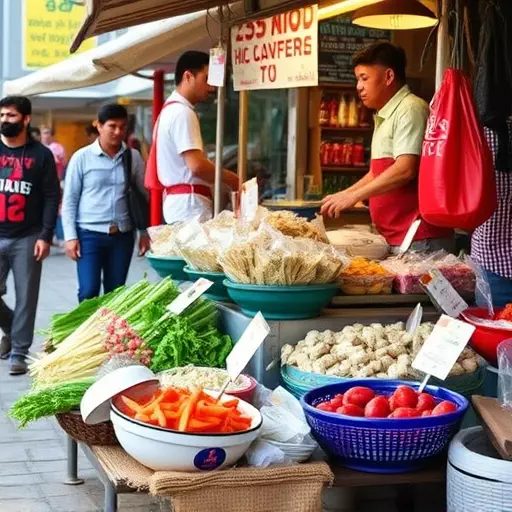Local food delivery services, especially those offering meal preparation, have revolutionized small farm operations by providing direct sales channels, promoting transparency, and embracing sustainable farming practices. These services connect consumers with fresh, seasonally appropriate produce, support local economies, reduce food waste, and enhance community food security. By collaborating with nearby farms, restaurants optimize their sourcing while farmers benefit from expert handling techniques. This trend caters to consumers' growing demand for locally sourced meals, transforming the local food industry and fostering a vibrant culinary scene that benefits both farmers and communities.
Local food delivery services are revolutionizing the way we access fresh, locally sourced produce. This article delves into the multifaceted benefits of supporting small farms through direct-to-doorstep meals. We explore how local food delivery fosters sustainable agricultural practices, enhances community health, and strengthens relationships between restaurants and farmers. Additionally, we analyze the role of meal preparation services in promoting robust local food systems and discuss consumer awareness as a driving force behind these trends.
- Understanding the Impact of Local Food Delivery on Small Farms
- Benefits for Community: Access to Fresh Produce and Sustainable Practices
- The Role of Meal Preparation Services in Promoting Local Food Systems
- Building Partnerships: How Restaurants and Farmers Collaborate for Success
- Consumer Awareness and Demand: Driving Change in Local Food Delivery Trends
Understanding the Impact of Local Food Delivery on Small Farms

Local food delivery services have significantly impacted small farms, offering them a direct and lucrative sales channel for their fresh produce. By partnering with local restaurants or creating their own meal preparation operations, farms can bypass traditional wholesale routes that often involve middlemen and lower profit margins. This shift empowers farmers to connect directly with consumers, fostering transparency in the food system.
Moreover, these services encourage sustainable farming practices as they promote shorter supply chains, reducing transportation-related emissions and minimizing produce spoilage. With local food delivery, small farms can also tailor their offerings to meet diverse dietary needs and preferences, enhancing customer satisfaction and building loyal client bases. This personalized aspect of meal preparation contributes to a thriving local culinary scene, benefiting both farmers and consumers alike.
Benefits for Community: Access to Fresh Produce and Sustainable Practices

Local food delivery services that include meal preparation not only bring delicious, freshly cooked meals to people’s doorsteps but also offer a myriad of benefits for the community. One of the most significant advantages is improved access to fresh produce. By partnering with local farms and producers, these services ensure that residents can enjoy seasonally appropriate vegetables, fruits, and other agricultural products straight from the source. This promotes a healthier diet and supports the local economy by fostering direct connections between farmers and consumers.
Additionally, these partnerships encourage sustainable farming practices. Local farms tend to have more personalized approaches to agriculture, often employing eco-friendly methods such as organic farming, crop rotation, and reduced chemical use. By supporting them through meal preparation services, communities contribute to a greener environment and help preserve agricultural heritage. This symbiotic relationship benefits both the community’s health and well-being and the long-term viability of local food systems.
The Role of Meal Preparation Services in Promoting Local Food Systems

Meal preparation services play a pivotal role in promoting local food systems by facilitating direct connections between consumers and nearby farms. These services don’t just provide convenient local food delivery; they also address logistical challenges faced by small-scale farmers. By aggregating demand and streamlining distribution, meal prep companies enable local farmers to focus on cultivation rather than marketing or sales. This collaboration fosters sustainability, ensuring that fresh, locally sourced produce reaches households efficiently.
Furthermore, meal preparation services contribute to the overall health and vibrancy of local food economies. They encourage a circular system where surplus farm goods are transformed into nutritious meals, reducing food waste. By prioritizing local ingredients, these services enhance food security at the community level, supporting agricultural diversity and nurturing relationships between farmers and consumers.
Building Partnerships: How Restaurants and Farmers Collaborate for Success

In the realm of local food delivery, a powerful synergy is forged between restaurants and local farms, driving success for both entities. This collaboration begins with an understanding that sustainable practices are mutually beneficial; restaurants source fresh, seasonal produce directly from nearby farms, ensuring ingredient quality and reducing carbon footprints associated with long-distance transport. In turn, farmers gain a stable market for their products, fostering a direct relationship with consumers and promoting local economies.
Meal preparation processes are also streamlined through this partnership. Restaurants can design menus that showcase the best seasonal offerings, creating exciting culinary experiences for customers. Meanwhile, farmers benefit from restaurants’ expertise in food handling and preservation techniques, ensuring their produce is prepared and packaged optimally for delivery. This collaboration not only supports local agriculture but also enhances the overall local food delivery experience, providing consumers with fresh, delicious meals prepared with care and a deep connection to the source of their ingredients.
Consumer Awareness and Demand: Driving Change in Local Food Delivery Trends

In today’s digital era, consumers are becoming increasingly conscious of their food choices’ impact on local farms and communities. This heightened awareness is a driving force behind the growing demand for local food delivery services that prioritize fresh, locally sourced ingredients. With just a few clicks, customers can now access a diverse range of meal preparation options, from farm-to-table restaurants to specialty food delivery apps.
This shift in consumer behavior is significantly impacting the local food industry. Restaurants and delivery platforms are responding by forging direct partnerships with nearby farms, ensuring that produce is not only fresh but also supports sustainable agricultural practices. As a result, consumers not only enjoy delicious meals prepared with high-quality, locally sourced ingredients but also contribute to the economic vitality of their communities.
Local food delivery services have a significant positive impact on small farms by fostering sustainable practices and enhancing community access to fresh produce. The collaboration between restaurants and farmers, coupled with growing consumer demand for local meal preparation options, is revolutionizing the way we source our food. By supporting local farms through these innovative delivery models, communities can promote environmental sustainability and strengthen their economic landscape. Local food delivery trends are not just a fad; they represent a crucial step towards a more resilient and vibrant food system.


